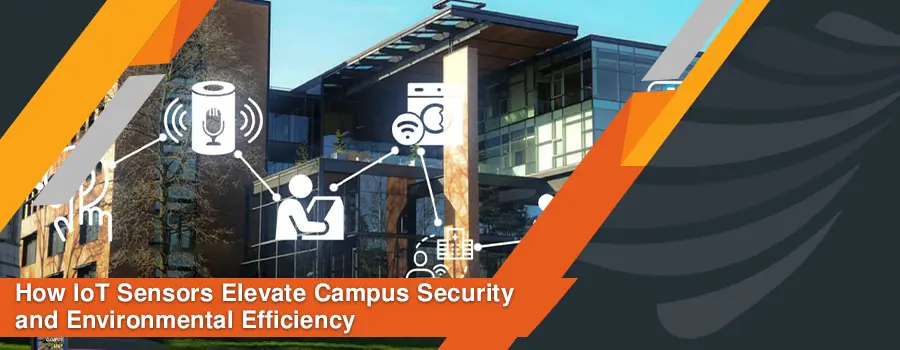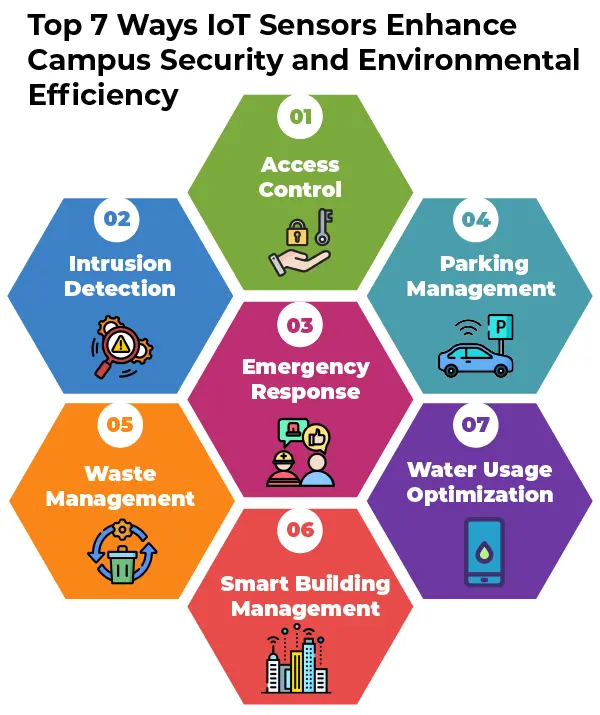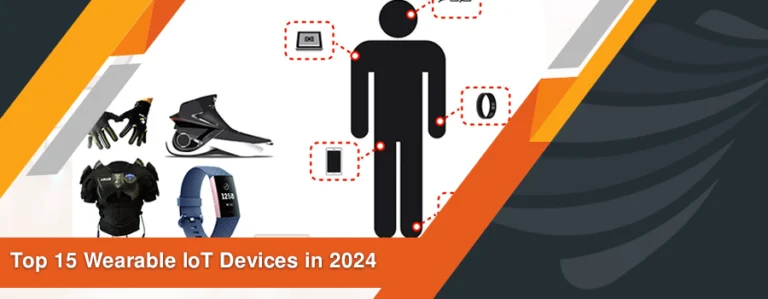After the rise of terrorist attacks and environmental security concerns, there is a paramount need to enhance safety and security at university campuses. In 2024, the United States continues to face significant threats from domestic and foreign terrorism. According to the Department of Homeland Security (DHS), the potential for violence from domestic radicalization remains high, with most occurrences involving lone offenders or small groups.
Despite several environmental legislations passed over the years, pollution remains an essential problem in the United States. Every day, human-induced processes such as production, transport, and garbage generation continue emitting massive amounts of harmful toxins into the land, sea, and air. These pollutants hurt the environment and endanger the health of billions of citizens nationwide.
Given the gravity of these challenges, we present IoT sensor-based smart solutions that can be deployed at university campuses to effectively tackle security concerns and improve environmental efficiency.
What are IoT-based Smart University Campuses?
This age has seen far-reaching technological advancements in cloud computing, big data, the Internet of Things (IoT), and artificial intelligence (AI). Higher education institutions (HEI) have implemented these technologies to improve university students’ and faculty’s teaching, learning, research experiences, and commute, including alternative attendance forms, smart parking solutions, intelligent learning environments, and collaboration. Today, university administrators are increasingly embracing digital campus reforms.
The digitally changed university campus is often known as a Smart campus. Smart campuses model the smart city ecosystem and allow the staff and students to improve daily life activities and learning at the university.
Integrating IoT sensors makes the environment more connected, efficient, and responsive. It enhances various aspects of campus life, such as environmental efficiency, security, resource management, and overall routine experiences.
Why Do You Need a Smart University Campus?
Smart campuses are a new concept fueled by digital transformation prospects in higher education. They are frequently viewed as miniature versions of smart cities that serve as living laboratories for smart technology research, development, and adoption in addition to their traditional teaching, learning, and research activities.
We need smart-university campuses because integrating IoT technology helps address several issues students and staff face in daily campus visits, such as parking issues, security concerns, and environmental damage. The higher education industry greatly impacts the environment. Many institutions have tried to lessen their ecological footprint in recognition of this. These activities include technology integration, awareness campaigns, and a move toward greener efforts.
Top 7 Ways IoT Sensors Enhance Campus Security and Environmental Efficiency
1. Access Control
One of the main concerns of university security is to ensure that only authorized persons can enter the campus premises. IoT sensors help integrate with access control systems and automatically restrict entry to authorized individuals, enhancing campus security, students, staff, and resources. For example, not everyone is allowed to enter university premises without permission.
To ensure this, OLIOS-LPR can be installed at the campus entrance. It scans the license plates of vehicles entering and leaving the campus and then compares the data with the database to identify whether the vehicle is registered, making it easy to maintain security.
2. Intrusion Detection
Intrusion detection is a critical element for campus security, ensuring the protection of staff and students. AssetGuard is a smart fence-mounted intrusion detection system that uses a specialized detection cable with sensors to monitor vibrations caused by attempts to climb, cut, or lift the fence.
Built on innovative stereo Doppler technology motion sensors, AssetGuard solutions warn of threats and perimeter breaches before an event occurs with the peace of mind of False Alarm-Free reliability. With AssetGuard, we can enhance campus security and get real-time notifications whenever an unauthorized attempt is detected.
3. Emergency Response
Campus security is a significant aspect, regardless of campus size. The core of campus safety is the first action to take in an emergency, which should be the most lightning-fast and effective. Safety is among the issues related to implementing the IoT (Internet of Things) on our campus. To illustrate, smart and IoT-enabled smoke detectors and chemical sensors can give real-time alerts about fires and spills of hazardous materials.
Furthermore, these sensors provide emergency response personnel and campus security with a specific location and nature of the emergency data. This instant warning of the incident allows people to attain greater safety, and the response method becomes more effective.
4. Parking Management
Parking management is an important part of the campus. One of the smart parking solutions specifically designed for university campuses is Calamus. It can give a parking experience that is happier for students and can decrease traffic jams. IoT sensors in parking spaces and entrance gates collect and deliver up-to-date parking occupancy data. Cab drivers can log on to the mobile application to book parking space and get real-time navigation to the booked parking spot.
Also, the Calamus collects data on parking duration and sends alerts if someone stays longer than permitted, making parking more efficient and less wasteful. Overall, this smart parking guidance system enhances convenience for university students and helps reduce carbon footprints, fuel consumption, and traffic congestion.
5. Waste Management
Effective waste management is required to maintain a sustainable and clean university environment. US universities only average a 24% recycling rate, a surprisingly low number reflecting the need for improved waste diversion and campus recycling efforts. Implementing IoT solutions like BinWise can help the campus effectively manage waste disposal.
BinWise is a smart waste management solution with waste-level detection sensors for each bin. The level-sensing sensors continuously monitor and measure the fill levels in the waste bins and automatically alert the facility managers via web application when the bin is about to fill up or has crossed its threshold garbage collection level. This information is transferred to the facility’s garbage collectors to empty the waste bin on time. BinWise can be installed all over the campus to enhance recycling and automated garbage cleaning.
6. Smart Building Management
It is time to transform conventional university buildings into smart buildings. This is essential for optimizing university security, enhancing comfort, and reducing energy consumption. The modern designs of university campuses are equipped with smart lighting systems, HVAC, waste management, leak detection, and security systems. Integrating these systems allows us to transform university facilities and give students the best environment for learning. However, managing all sensors and systems can be a hassle; therefore, we also need smart building management.
HIVE is a smart building management solution that integrates many IoT sensors, including temperature, water, humidity, air quality, and more, to collect, combine, and analyze millions of data points from buildings. Its adaptability and remote management make it a comprehensive, scalable solution for campus building management.
7. Water Usage Optimization
According to recent research, around 1,529,288 liters of wastewater are generated daily on the University campus. One of the major aspects of water wastage is leakage, which is often undetectable. This issue can be resolved by integrating IoT sensors.
IoT sensors installed in campus buildings’ water systems provide real-time data on water usage. These sensors identify abnormalities in consumption patterns, including leaks or sudden increases in water use. Maintenance crews receive immediate notifications, allowing prompt leak detection and repair, preventing water waste, and minimizing infrastructure damage.
Future Aspects of IoT Sensors on University Campus
The future application of IoT sensors in university campuses promises a transformation of the education landscape followed by enhanced security, smart teaching methods, optimized resource management, and effective utilization of modern technology. We expect a future where our data is stored for life with high-end security. Students also get a smart learning environment featuring virtual headsets and hologram technology.
The university will become a place where students come with excitement, facing no hassle in traveling thanks to smart public transportation that reduces expenses and waiting time. As IoT advances, these innovations will create a smarter, safer, and more efficient space that enhances the educational experience.
In a Nutshell
IoT sensors have enormous potential to improve resource management, increase security, and enhance environmental efficiency on campuses. Universities need to adopt advanced IoT solutions to enhance campus life, encourage sustainability, and prepare for the problems that lie ahead. By investing in IoT solutions now, educational institutions can set the standard for smarter, safer, and more efficient campuses of the future.





